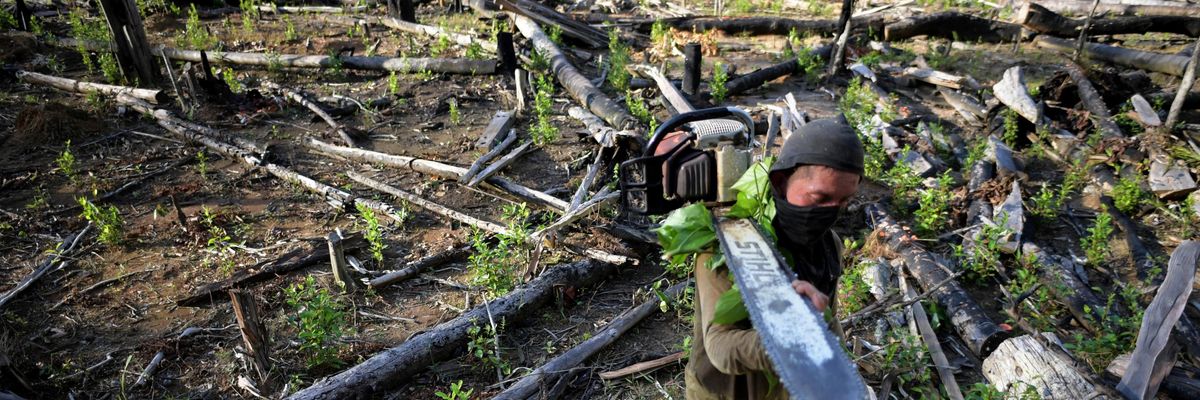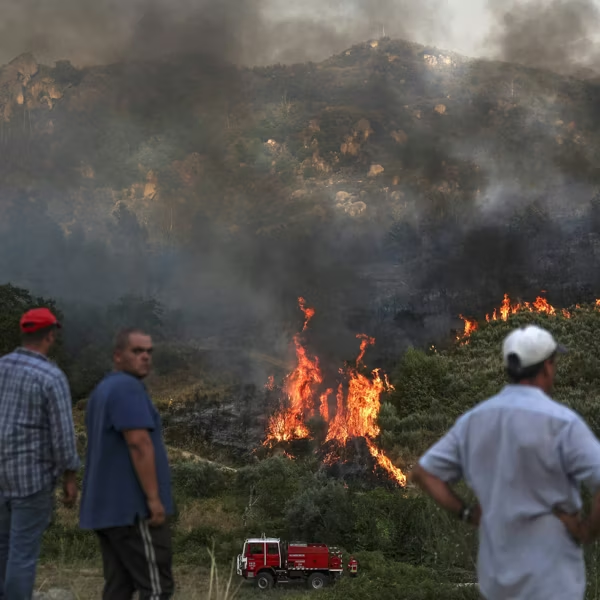
A farmer carries a chainsaw after cutting down trees to plant coca in the Amazon rainforest in Guaviare department, Colombia, on December 6, 2021. (Photo: Raul Arboleda/ AFP via Getty Images)
Rampant Tropical Forest Loss Belies COP26 Deforestation Pledge: Report
"Such losses are a disaster for the climate. They're a disaster for biodiversity. They're a disaster for Indigenous peoples and local communities."
The destruction of tens of thousands of square miles of Earth's tropical forests in 2021 underscores the challenge of fulfilling a pledge made by nations at last year's United Nations Climate Conference to halt deforestation by the end of the decade, a report published Thursday asserted.
"We have to dramatically reduce emissions from all sources."
According to the World Resources Institute's (WRI) Global Forest Review, the planet's tropical regions lost 11.1 million hectares, or 42,857 square miles, of primary old-growth forest in 2021, a total area roughly the size of the country of Bulgaria or the U.S. state of Virginia.
WRI senior fellow Frances Seymour told The Guardian that "such losses are a disaster for the climate. They're a disaster for biodiversity. They're a disaster for Indigenous peoples and local communities."
The WRI figure includes 3.75 million hectares of tropical primary rainforest loss--described by the report as "areas of critical importance for carbon storage and biodiversity"--or the equivalent of 10 soccer fields per minute. Last year's tropical primary forest loss resulted in the release of 2.5 billion tons of carbon dioxide, the equivalent of India's total annual fossil fuel emissions.
With more than 1.5 million hectares destroyed, Brazil lost the most tropical primary forest by far last year, followed by Congo (499,059 hectares), Bolivia (291,379 hectares), and Indonesia (202,905 hectares). In terms of percentage of tropical primary forest lost, Cambodia led the world with 1.5%, followed by Laos (1%) and Bolivia (0.7%).
The report also notes record losses of boreal forests, mainly in Russia, which suffered the worst wildfire season in recorded history.
In addition to fueling the climate emergency by releasing greenhouse gases into the atmosphere, deforestation degrades land, increases flooding, alters weather patterns, and harms biodiversity through habitat destruction.
According to the World Wildlife Fund, clearing trees for cattle grazing is by far the leading driver of deforestation, with scientists attributing 80% of Brazilian Amazon rainforest loss to the beef industry.
The report says the world has made little progress toward fulfilling a pledge by more than 140 countries attending COP26--last year's U.N. summit in Glasgow, Scotland--to "halt and reverse forest loss and land degradation by 2030," a goal that "will require a consistent decline in forest loss every year for the rest of the decade--a decline that is not yet happening in the tropics as a whole."
However, the publication does highlight some success stories. Primary forest loss has declined significantly in Indonesia and Malaysia, while countries including Gabon and Guyana have lost 1% or less of their primary forests over the past two decades.
The WRI report follows research published last month warning that the ability of the Amazon rainforest to recover from droughts and wildfires has been declining over the past two decades, driving the crucial ecosystem toward what authors called a "critical transformation" from forest to grassland, a shift that would have "profound" consequences.
"That would release enough carbon into the atmosphere to blow the Paris agreement goals right out of the water," said Seymour.
"We have to dramatically reduce emissions from all sources," she added. "No one should even think anymore about planting trees instead of reducing emissions from fossil fuels. It's got to be both and it's got to be now before it's too late."
An Urgent Message From Our Co-Founder
Dear Common Dreams reader, The U.S. is on a fast track to authoritarianism like nothing I've ever seen. Meanwhile, corporate news outlets are utterly capitulating to Trump, twisting their coverage to avoid drawing his ire while lining up to stuff cash in his pockets. That's why I believe that Common Dreams is doing the best and most consequential reporting that we've ever done. Our small but mighty team is a progressive reporting powerhouse, covering the news every day that the corporate media never will. Our mission has always been simple: To inform. To inspire. And to ignite change for the common good. Now here's the key piece that I want all our readers to understand: None of this would be possible without your financial support. That's not just some fundraising cliche. It's the absolute and literal truth. We don't accept corporate advertising and never will. We don't have a paywall because we don't think people should be blocked from critical news based on their ability to pay. Everything we do is funded by the donations of readers like you. Will you donate now to help power the nonprofit, independent reporting of Common Dreams? Thank you for being a vital member of our community. Together, we can keep independent journalism alive when it’s needed most. - Craig Brown, Co-founder |
The destruction of tens of thousands of square miles of Earth's tropical forests in 2021 underscores the challenge of fulfilling a pledge made by nations at last year's United Nations Climate Conference to halt deforestation by the end of the decade, a report published Thursday asserted.
"We have to dramatically reduce emissions from all sources."
According to the World Resources Institute's (WRI) Global Forest Review, the planet's tropical regions lost 11.1 million hectares, or 42,857 square miles, of primary old-growth forest in 2021, a total area roughly the size of the country of Bulgaria or the U.S. state of Virginia.
WRI senior fellow Frances Seymour told The Guardian that "such losses are a disaster for the climate. They're a disaster for biodiversity. They're a disaster for Indigenous peoples and local communities."
The WRI figure includes 3.75 million hectares of tropical primary rainforest loss--described by the report as "areas of critical importance for carbon storage and biodiversity"--or the equivalent of 10 soccer fields per minute. Last year's tropical primary forest loss resulted in the release of 2.5 billion tons of carbon dioxide, the equivalent of India's total annual fossil fuel emissions.
With more than 1.5 million hectares destroyed, Brazil lost the most tropical primary forest by far last year, followed by Congo (499,059 hectares), Bolivia (291,379 hectares), and Indonesia (202,905 hectares). In terms of percentage of tropical primary forest lost, Cambodia led the world with 1.5%, followed by Laos (1%) and Bolivia (0.7%).
The report also notes record losses of boreal forests, mainly in Russia, which suffered the worst wildfire season in recorded history.
In addition to fueling the climate emergency by releasing greenhouse gases into the atmosphere, deforestation degrades land, increases flooding, alters weather patterns, and harms biodiversity through habitat destruction.
According to the World Wildlife Fund, clearing trees for cattle grazing is by far the leading driver of deforestation, with scientists attributing 80% of Brazilian Amazon rainforest loss to the beef industry.
The report says the world has made little progress toward fulfilling a pledge by more than 140 countries attending COP26--last year's U.N. summit in Glasgow, Scotland--to "halt and reverse forest loss and land degradation by 2030," a goal that "will require a consistent decline in forest loss every year for the rest of the decade--a decline that is not yet happening in the tropics as a whole."
However, the publication does highlight some success stories. Primary forest loss has declined significantly in Indonesia and Malaysia, while countries including Gabon and Guyana have lost 1% or less of their primary forests over the past two decades.
The WRI report follows research published last month warning that the ability of the Amazon rainforest to recover from droughts and wildfires has been declining over the past two decades, driving the crucial ecosystem toward what authors called a "critical transformation" from forest to grassland, a shift that would have "profound" consequences.
"That would release enough carbon into the atmosphere to blow the Paris agreement goals right out of the water," said Seymour.
"We have to dramatically reduce emissions from all sources," she added. "No one should even think anymore about planting trees instead of reducing emissions from fossil fuels. It's got to be both and it's got to be now before it's too late."
The destruction of tens of thousands of square miles of Earth's tropical forests in 2021 underscores the challenge of fulfilling a pledge made by nations at last year's United Nations Climate Conference to halt deforestation by the end of the decade, a report published Thursday asserted.
"We have to dramatically reduce emissions from all sources."
According to the World Resources Institute's (WRI) Global Forest Review, the planet's tropical regions lost 11.1 million hectares, or 42,857 square miles, of primary old-growth forest in 2021, a total area roughly the size of the country of Bulgaria or the U.S. state of Virginia.
WRI senior fellow Frances Seymour told The Guardian that "such losses are a disaster for the climate. They're a disaster for biodiversity. They're a disaster for Indigenous peoples and local communities."
The WRI figure includes 3.75 million hectares of tropical primary rainforest loss--described by the report as "areas of critical importance for carbon storage and biodiversity"--or the equivalent of 10 soccer fields per minute. Last year's tropical primary forest loss resulted in the release of 2.5 billion tons of carbon dioxide, the equivalent of India's total annual fossil fuel emissions.
With more than 1.5 million hectares destroyed, Brazil lost the most tropical primary forest by far last year, followed by Congo (499,059 hectares), Bolivia (291,379 hectares), and Indonesia (202,905 hectares). In terms of percentage of tropical primary forest lost, Cambodia led the world with 1.5%, followed by Laos (1%) and Bolivia (0.7%).
The report also notes record losses of boreal forests, mainly in Russia, which suffered the worst wildfire season in recorded history.
In addition to fueling the climate emergency by releasing greenhouse gases into the atmosphere, deforestation degrades land, increases flooding, alters weather patterns, and harms biodiversity through habitat destruction.
According to the World Wildlife Fund, clearing trees for cattle grazing is by far the leading driver of deforestation, with scientists attributing 80% of Brazilian Amazon rainforest loss to the beef industry.
The report says the world has made little progress toward fulfilling a pledge by more than 140 countries attending COP26--last year's U.N. summit in Glasgow, Scotland--to "halt and reverse forest loss and land degradation by 2030," a goal that "will require a consistent decline in forest loss every year for the rest of the decade--a decline that is not yet happening in the tropics as a whole."
However, the publication does highlight some success stories. Primary forest loss has declined significantly in Indonesia and Malaysia, while countries including Gabon and Guyana have lost 1% or less of their primary forests over the past two decades.
The WRI report follows research published last month warning that the ability of the Amazon rainforest to recover from droughts and wildfires has been declining over the past two decades, driving the crucial ecosystem toward what authors called a "critical transformation" from forest to grassland, a shift that would have "profound" consequences.
"That would release enough carbon into the atmosphere to blow the Paris agreement goals right out of the water," said Seymour.
"We have to dramatically reduce emissions from all sources," she added. "No one should even think anymore about planting trees instead of reducing emissions from fossil fuels. It's got to be both and it's got to be now before it's too late."

